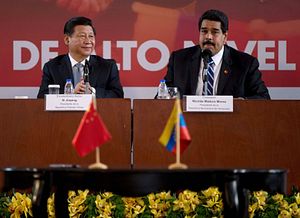Venezuela’s mounting political crisis came to a head last week, when National Assembly head Juan Guaido officially declared himself the interim president, calling the 2018 elections that returned President Nicolas Maduro to power illegitimate. Despite mass protests being held across Venezuela, Maduro has refused to step down.
Now the world is taking sides. The United States quickly recognized Guiado as president, as did most of Venezuela’s fellow South American countries (with Bolivia being a notable exception). U.S. allies Canada, Australia, and the United Kingdom also recognized Guiado. On Thursday the EU parliament recognized Guiado as Venezuela’s interim president, after most of Europe called for new elections in the country.
On the other hand, much of Asia has either remained silent or issued support for Maduro – and that latter category includes China, one of the Maduro government’s key financial supporters. China has approached the crisis by reiterating its longstanding policy of noninterference, which in this instance translates to support for the Maduro government.
On January 23, Chinese Foreign Ministry spokesperson Hua Chunying noted the basic outline of China’s position. Hua said that all relevant parties should “seek a political solution to the issue of Venezuela through peaceful dialogue within the framework of the Venezuelan Constitution.”
“China always upholds the principle of noninterference in other counties’ internal affairs and opposes foreign interference in Venezuela’s affairs,” Hua added.
On January 28, another Foreign Ministry spokesperson, Geng Shuang, expanded on China’s position by adding: “We support the Venezuelan government’s efforts to uphold national sovereignty, independence, and stability.” Geng further called on “all countries” to “oppose external intervention in Venezuela’s own affairs as well as any attempts by one country to interfere in another’s internal affairs” – a not-so-subtle reference to the United States’ attempts to put pressure on the Maduro government. The Trump administration has hit Venezuela’s state oil company with painful sanctions that are expected to deepen the existing economic crisis in the country.
As for which leader China recognizes, Geng pointed out that a “Special Envoy of President Xi Jinping attended the inauguration ceremony of President Maduro. If China does not recognize him, why did we send a Special Envoy to attend his inauguration ceremony?”
China’s close relationship with Venezuela predates Maduro. Late President Hugo Chavez actively courted Chinese investment and loans. Beijing, for its part, was attracted by the country’s oil supplies, which became the collateral – and primary means of repayment – for the loans. Under Chavez, Venezuela quickly grew into China’s strongest partner in South America, and the rewards were rich: the China Development Bank alone provided a staggering $42.5 billion in loans to Caracas between 2007 and 2012. As Matt Ferchen pointed out in a 2012 article for The Diplomat, at the time that amount accounted for “for nearly 60 percent of the bank’s loans to Latin America and the Caribbean.”
That heyday, however, left China with a headache when Venezuela’s economy began to crumble under Maduro, Chavez’s successor. Oil prices cratered in 2014, a heavy blow for a country that relies on oil and gas revenue for a quarter of its GDP. Rock-bottom oil prices also meant that Venezuela would have to export more oil to China to repay its loans – leaving less oil for sale and compounding the revenue problem.
China recognized the problem. In 2014, according to AidData, a research lab based at the College of William and Mary that tracks Chinese foreign aid, Beijing announced that it had had to relax the terms of its $50 billion in loans to Venezuela:
It removed the minimum quantity of oil sent for repayment (previously 330 thousand barrels per day), allowed Venezuela’s government to make contributions in local currency rather than US dollars, and altered the maturity of one of three loan tranches.
As Venezuela’s economy faltered, Maduro made it clear that he was hoping China would bail his country out. His hopes were rewarded with a $4 billion cash-for-oil deal in July 2014, and again with another $5 billion loan in April 2015.
Yet there was a clear reluctance from Beijing by this point, and the new loans reportedly carried strict conditions. Around the same time, Chinese scholars began to warn that Beijing should take more care to “guard against bad debts” by avoiding risky investments – just like Venezuela.
China thus finds itself somewhat stuck. It can abandon Maduro, possibly losing an attractive foothold in South America as well as billions of dollars worth of oil that’s effectively already been paid for. Or Beijing can continue to support Maduro – but run the real risk of throwing good money after bad.
That may be why Beijing has largely allowed Russia to take point on countering the U.S. position. In a testy UN Security Council meeting on Venezuela on January 26, Russian representative Vassily Nebenzia accused the United States of seeking “regime change” in Venezuela and helping push the country “to the edge of a bloodbath.” By contrast, China’s representative Ma Zhaoxu “called on all parties to stay rational and keep calm” and “called on all relevant parties to respect the choice of Venezuela’s people.”
China opposes the U.S. push to oust Maduro, and the corresponding unilateral sanctions, on principle. And Beijing certainly has a preference for keeping a known quantity in power to safeguard its existing loans to and investments in Venezuela. But don’t mistake that pragmatic policy for a wholehearted embrace of Maduro. Above all else, China values stability, and Maduro has failed spectacularly to provide that.

































